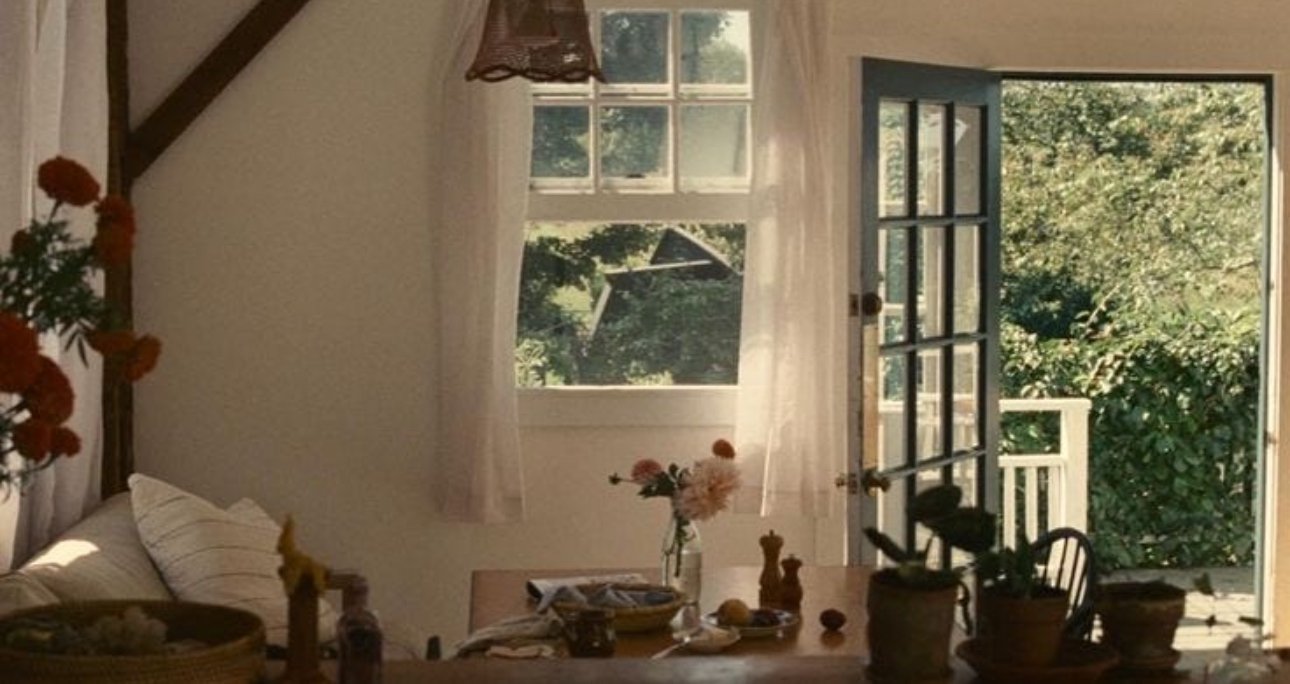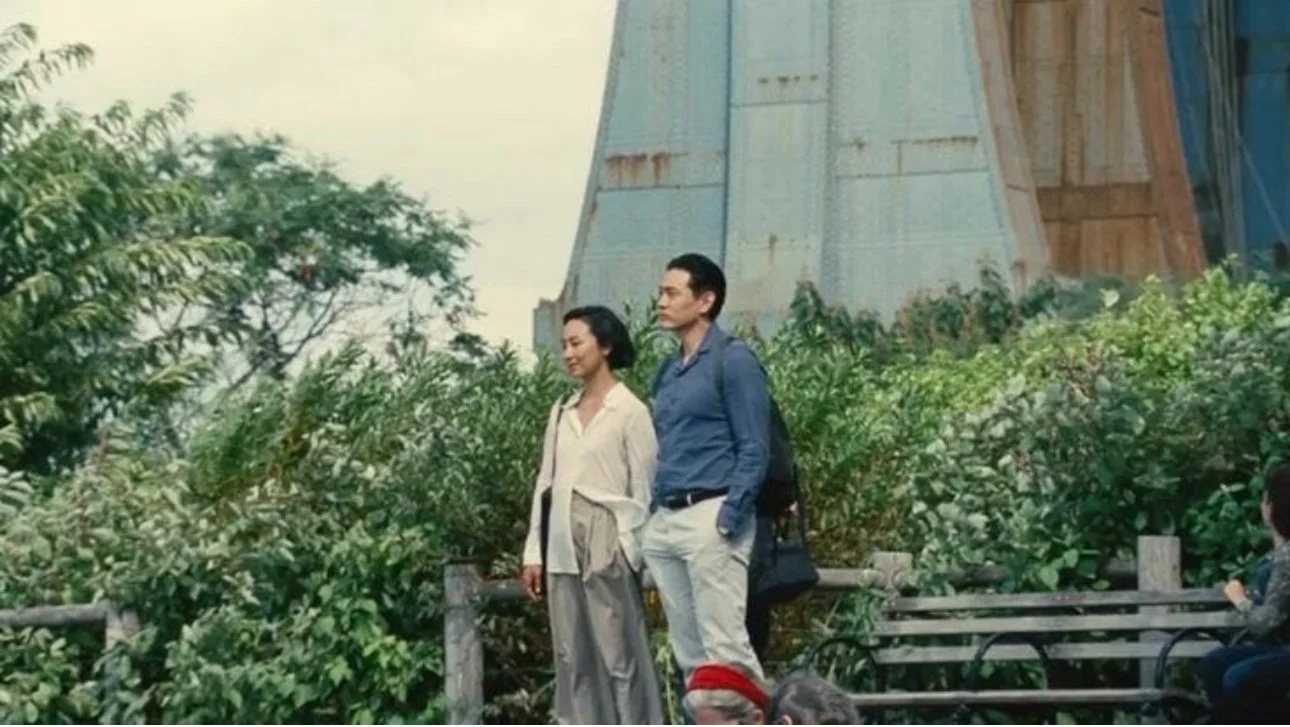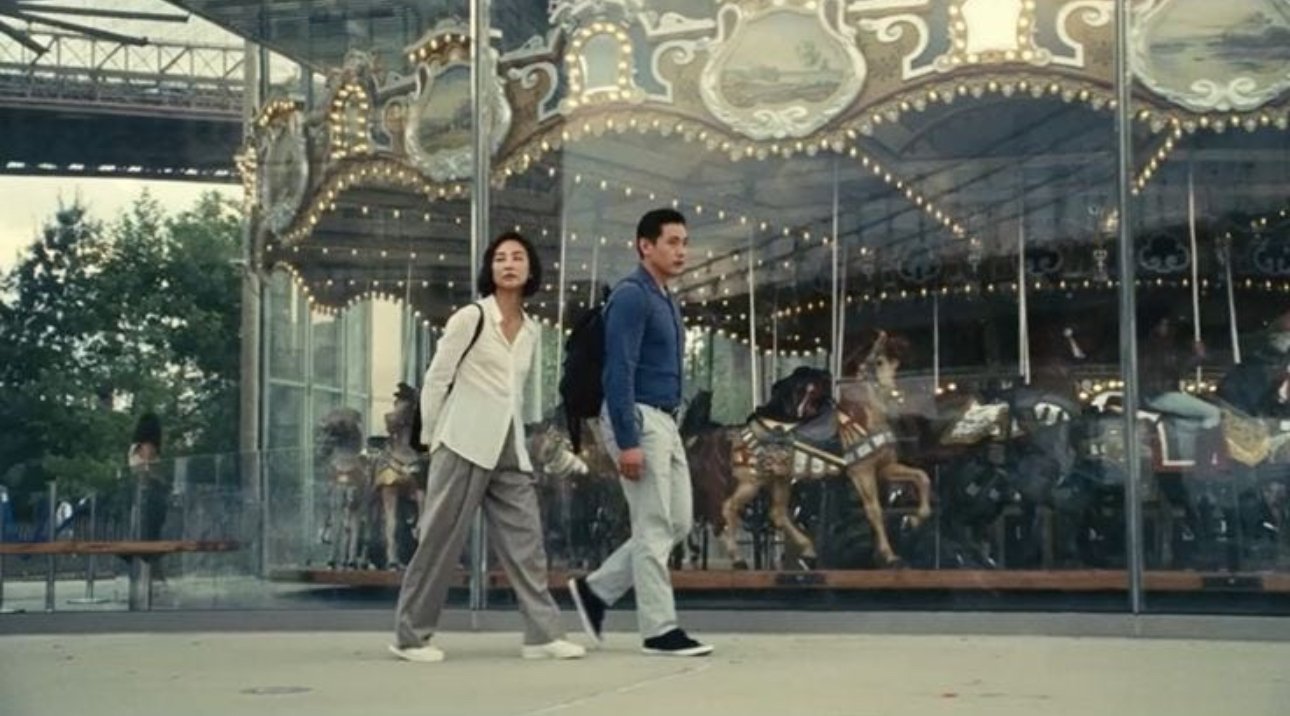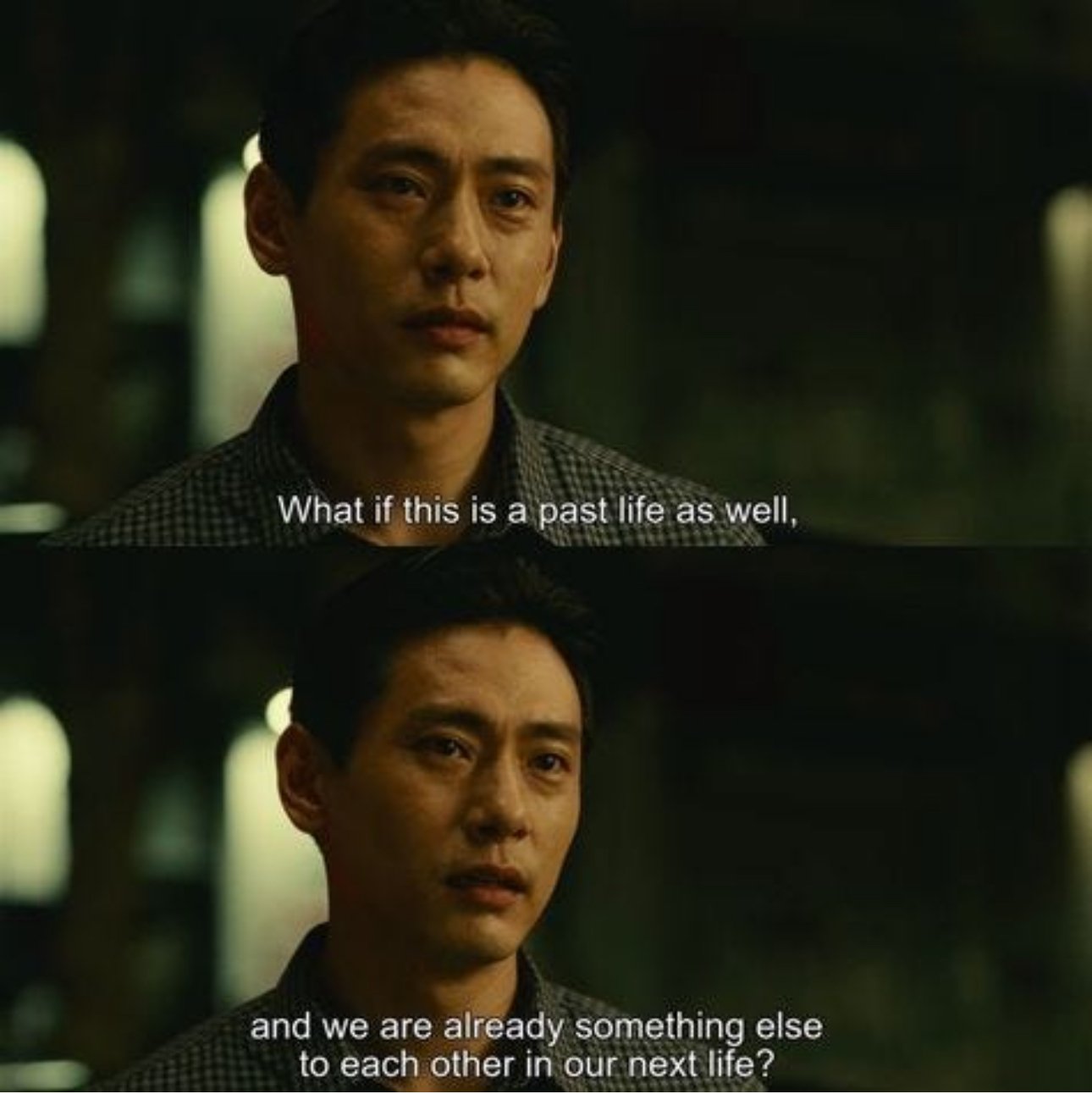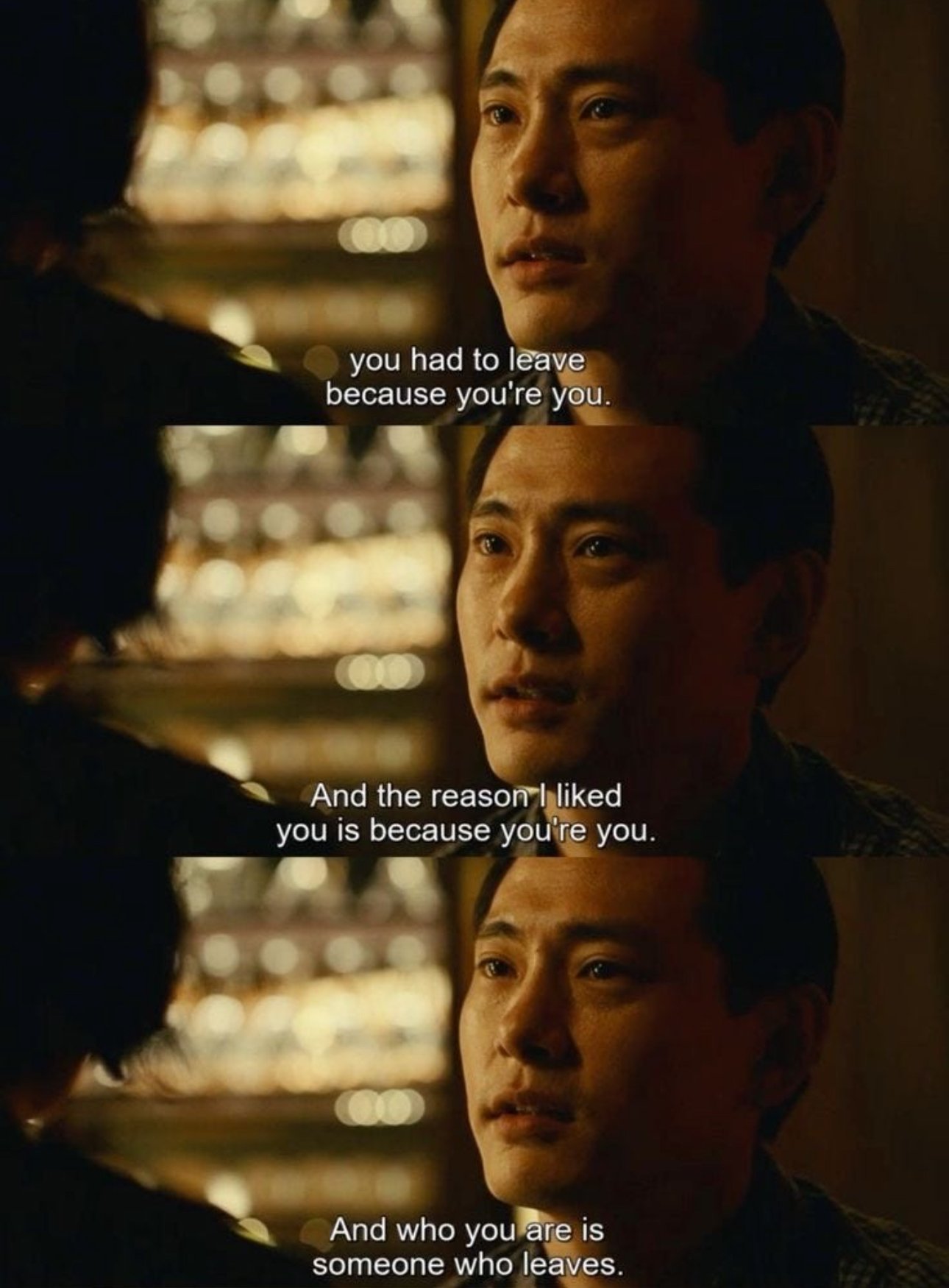Past Lives
By Natalie McCarty
“If you leave something behind, you gain something, too.”
Film stands as one of the most transformative tools humanity possesses. It’s a visual medium capable of bringing past experiences, memories, and imagined stories to life on the silver screen — an art form in its own right. The ability to pair original scores or perfectly matched soundtracks with scenes is a talent not easily mastered. Yet, when a filmmaker achieves this feat, capturing every detail of a story with precision, the result is beyond beautiful–it’s life-changing.
That’s perhaps why I’ve always found movies to be so compelling. Despite my deep love for music, art, and literature, it’s film that holds the strongest grip on my heart. There’s an undeniable power in capturing fleeting moments or narratives and translating them in the grandest and most accessible way possible.
Movies offer a unique opportunity to grow in experience, gain new perspectives, and broaden your mind — an immensely powerful feat. In just a two or three-hour viewing experience, they can impart wisdom that might otherwise take years of lived experience to attain. And that’s precisely what Celine Song’s Past Lives achieves. It imparts wisdom, expands minds, and has the potential to change lives.
Past Lives stands out as undeniably one of the best films I’ve ever had the privilege of seeing in my lifetime. The fact that this is Song’s debut film is simply mind-blowing. There are filmmakers who spend their entire lives striving to create something good, yet they pale in comparison to the greatness achieved here.
The cinematography is truly remarkable. It captures the beauty and poignancy of life’s little moments, those glimmers and corners that we often remember only through our own eyes, thoughts, and memories.
The writing and dialogue are masterfully crafted, drawing me so deeply into the lives of Nora and Hae Sung that I felt as though I was slipping away from the sofa and into their world. I experienced a pang of grief in my own heart as if I had lived their lives 24 years ago. I felt the twelve years of distance between them keenly — it resonated with me on a profound level.
While I’ve never immigrated from Korea or even visited, I did once give up everything to move to New York. I found myself in the streets of the city, beneath the Brooklyn Bridge, in the parks, by the carousel, and in the cramped apartments. It was there that I found home, identity, and people who became my safe haven.
From the very first frame, Past Lives transported viewers into a world where past and present seamlessly intertwined, blurring the lines between memory and reality. Through breathtaking cinematography and evocative visuals, each scene felt like a painting come to life, drenched in vibrant hues and rich textures that captured the essence of each character’s journey.
The characters themselves were intricately crafted, each one a mosaic of complexities and contradictions that mirrored the human experience. Their struggles, joys, and heartaches unfolded with raw authenticity, drawing viewers into their lives with an irresistible magnetism.
Greta Lee’s portrayal of Nora struck a chord deep within me. Though she was a character I had never encountered before, I felt an uncanny familiarity with her. It was as if her life story was unfolding before my eyes, resonating with experiences I had never lived but somehow understood on a visceral level.
And watching Teo Yoo as Hae Sung awkwardly stumble through his journey of falling in love with Nora was simultaneously painful and beautiful. His portrayal was so raw and genuine, capturing the complexities of human emotions with remarkable skill. He truly deserves all the flowers for his performance in this role and more.
The chemistry between Greta Lee and Teo Yoo was palpable, adding an extra layer of depth to an already emotionally charged story. Their interactions were beautifully nuanced, drawing viewers into the intricate web of their relationship. Yet, despite the beauty of their connection, the story itself was filled with heartache and anguish, making it all the more poignant and unforgettable.
This movie truly stirred up memories I thought were long buried. It made me remember my life again. It’s a rare feat for a film to have such power — to jolt you back into your own past, to relive the loves, the losses, and the moments that shaped you.
Suddenly, I found myself transported back to New York City. I felt the wind slapping me in the face on the ferry to the Statue of Liberty. I remembered exactly how it felt to walk on the gritty streets of the East Village. I could practically taste the pasta in the air of the restaurant, and feel the warmth emanating from the bar where they sat. The New York air settling all around me.
I think I was able to feel as utterly drawn into this cinematic world as I was particularly because its opening scene felt like a direct invitation into the lives of its characters. As the commentators speculated about the dynamics among the trio at the bar, it evoked memories of my own past experiences. I reminisced about evenings spent with my old best friend, huddled over dinner tables, quietly conjecturing about the lives of those around us.
At times, our own realities felt overwhelming, prompting us to escape momentarily by delving into the imagined lives of others nearby. Watching this film was reminiscent of those moments — a nostalgic reminder of that shared experience. It’s the essence of New York, isn’t it? The city has a way of nudging you into a collective existence with your neighbors.
This movie stirred up those feelings within me, transporting me back to that vibrant city where such connections felt palpable. It’s moments like these that I find myself longing for, and this film captured them perfectly.
Another factor of what set Past Lives apart was its exploration of the universal themes of love, loss, and redemption. Through its poignant narrative arc, the film delved deep into the depths of the human soul, probing the deepest recesses of longing and desire. It was a journey of self-discovery and self-acceptance, where each character confronted their past demons and emerged transformed, forever changed by the power of love and forgiveness.
In a poignant scene between Nora and her husband, he tenderly expresses, “You make my world so much bigger, and I’m wondering if I do the same for you?” It’s a moment laden with depth, where they delve into the complexities of their relationship. Amidst this conversation, he also reveals that when she dreams, she speaks only in Korean — a revelation that underscores a profound understanding between them.
Through this exchange, we glimpse the ache of missed connections, particularly as Nora’s friend visits, offering a glimpse into a shared past only he could fully comprehend. Yet, what emerges is not a narrative of settling, but one of finding solace and understanding in the safety of her marriage. Her husband has become a beacon of stability and empathy in her journey.
However, the scene doesn’t diminish the longing Nora harbors for the missed connections of her past — at 12, at 24, and now at 36 — where someone truly grasped her dreams and aspirations. It’s a delicate balance, navigating between the comfort of the present and the lingering echoes of what could have been.
The preceding scene lays the groundwork for the poignant moment that truly struck me. As Nora, her husband, and Hae Sung gather at the bar, a palpable tension hangs in the air. In the midst of this, Nora and Hae Sung effortlessly slip into their own world of conversation, a world brimming with shared understanding and unspoken connections.
What unfolds next are the final confessions of love, loss, and unspoken emotions laid bare. Every sentiment that had lingered unexpressed between them is now voiced, each card on the table in a raw display of vulnerability. It’s the kind of intimate exchange that seems tailor-made for a bar setting — surrounded by others, bathed in dim light, with a drink in hand. It’s where hearts spill over in a way that feels uniquely genuine.
Amidst the hushed murmurs, they ponder the possibility of past lives and the prospect of being something else to each other in the next. They delve into the myriad of possibilities, exploring what they might have been or could become. It’s a conversation that’s as devastating as it is beautiful, a reflection of the complexities of life itself.
When Hae Sung uttered, “I liked you for who you are; and who you are is a person who leaves,” it felt like a piercing truth encapsulating the essence of their relationship. In that moment, everything seemed to crystallize, capturing the heartache and yet the strange solace of the situation. That, I believe, is the essence of what made this movie so emotionally impactful — the exploration of missed connections, the haunting “what ifs,” and the ache of almost-had moments.
His heartfelt admission, “I didn’t know that liking your husband would hurt this much,” struck a deep chord within me. In that moment, I found myself not only empathizing with Nora but also understanding Hae Sung’s perspective on a profound level. It’s a peculiar sensation because, in my own life, I can pinpoint individuals whom I feel connected to from a supposed past life, those whose absence in this life resonates deeply despite our fleeting encounter.
I envision a future where, perhaps many years down the road, we’ll reunite, our lives having taken divergent paths, yet still intertwined by shared memories. And just like Nora and Hae Sung, we may find ourselves sharing a night out, reminiscing over the passage of time.
To add another layer, Hae Sung and Nora’s husband even engage in conversation where there’s a shared acknowledgment of their circumstances and the bittersweet reality of time slipping away.
As much as this is a funeral for all of Nora and Hae Sung’s feelings — as well a resting place for all the things that had gone unsaid for so long — it’s also an avenue for both of Nora’s great loves in her life to see each other and lay aside the resentment or animosity between each other.
Despite the years lost and the stolen moments, there’s an undeniable need for this final exchange, this last goodbye (Jeff Buckley reference) — a poignant moment of closure amidst the complexity of human connection.
Past Lives transcended the realm of mere cinema; it evolved into an immersive journey, a profound contemplation on the delicate nature of existence and the indomitable strength inherent within humanity. It reached deep within us, stirring our emotions and prompting introspection, showcasing the timeless potency of storytelling to illuminate even the darkest corners of our reality and offer a beacon of hope in the face of uncertainty.
Moreover, it serves as a poignant reminder of the tangible imprints left behind in this life by individuals — perhaps even ourselves — from past incarnations. It evokes that uncanny sensation, that instinctive feeling of déjà vu, hinting at the possibility that we’ve treaded these paths before, lived these moments repeatedly. It’s a powerful testament to the cyclical nature of life, where each season brings forth echoes of experiences past, perpetuating a continuous journey of growth and rediscovery.
Past Lives stirred within me a profound longing for the life I once had, the love I cherished, and the souls I’ve mourned. Yet, amidst this bittersweet nostalgia, it offered a pathway to acceptance — of the present and the inevitable future. It provided a sanctuary for the pain and sorrow that the thought of New York (and all that is connotated with that) often evokes, fostering a sense of forgiveness towards myself, others, and the circumstances that shaped our past.
It encapsulated a fleeting moment in time, a tapestry woven with emotions felt, experiences lived, and possibilities pondered. Even as I contemplate what could have been, it remains my most profound “what if.”
I wonder if my “what ifs” in my next life are instead the branch that I–as a bird–accidentally sit on… I guess we’ll just have to see where my In-Yun takes me.

